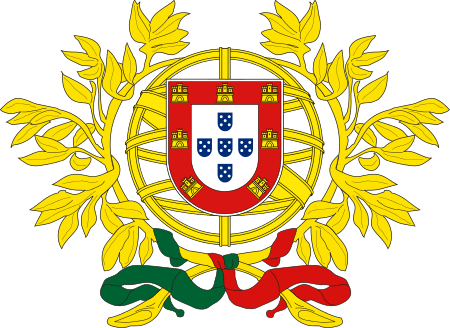1919 Portuguese legislative election
Parliamentary elections were held in Portugal on 11 May 1919.[1] The three main parties that boycotted the 1918 elections returned to contest the elections. The result was a victory for the Democratic Party, which won 86 of the 163 seats in the House of Representatives and 36 of the 71 seats in the Senate.[2][3]
| ||||||||||||||||||||||||||||||||||||||||||||||||||||||
163 seats to the Chamber of Deputies 82 seats needed for a majority | ||||||||||||||||||||||||||||||||||||||||||||||||||||||
|---|---|---|---|---|---|---|---|---|---|---|---|---|---|---|---|---|---|---|---|---|---|---|---|---|---|---|---|---|---|---|---|---|---|---|---|---|---|---|---|---|---|---|---|---|---|---|---|---|---|---|---|---|---|---|
| ||||||||||||||||||||||||||||||||||||||||||||||||||||||
| ||||||||||||||||||||||||||||||||||||||||||||||||||||||
 |
|---|
| This article is part of a series on the politics and government of Portugal |
| Constitution |
|
|
Legislature
|
|
|
|
Results
| Party | House of Representatives | Senate | ||||||
|---|---|---|---|---|---|---|---|---|
| Votes | % | Seats | +/– | Votes | % | Seats | +/– | |
| Democratic Party | 86 | New | 36 | New | ||||
| Evolutionist Party | 38 | New | 27 | New | ||||
| Republican Union | 17 | New | New | |||||
| Portuguese Socialist Party | 8 | New | 0 | New | ||||
| Catholic Centre Party | 1 | –4 | 1 | 1 | ||||
| Other parties and independents | 13 | –8 | 7 | –23 | ||||
| Invalid/blank votes | – | – | – | – | – | – | ||
| Total | 163 | +8 | 71 | –2 | ||||
| Registered voters/turnout | 500,000 | – | – | 500,000 | – | – | ||
| Source: Nohlen & Stöver | ||||||||
gollark: Fair, although they're somewhat more *complex* than "magic uninterceptable channel"l.
gollark: So only stuff like PotatOS ship strong crypto nowadays.
gollark: The other way would be some sort of hypercomplex crypto solution, but it would probably have its own problems and I think SquidDev said no to including that sort of thing in core CraftOS.
gollark: If they made it magically uninterceptable, that would be uncool and bad for learning.
gollark: Anyway, if they removed the rednet API, that would break 12471892518295 programs but stop people using a not-secure-even-though-it-looks-like-it-is API.
References
- Dieter Nohlen & Philip Stöver (2010) Elections in Europe: A data handbook, p1542 ISBN 978-3-8329-5609-7
- Nohlen & Stöver, pp1557-1558
- Nohlen & Stöver, p1543
External links
This article is issued from Wikipedia. The text is licensed under Creative Commons - Attribution - Sharealike. Additional terms may apply for the media files.

.png)

